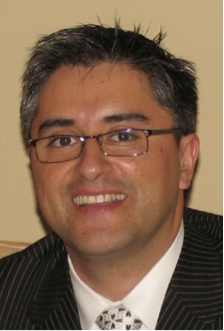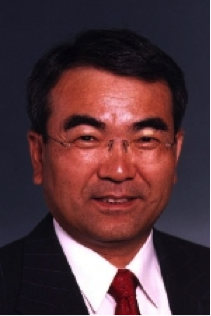Plenary Speakers
Home > Program > Plenary Speakers
- K.-S. Fu Prize Lecture: Rama Chellappa (University of Maryland, USA)
- J. K. Aggarwal Prize Lecture: René Vidal (Johns Hopkins University, USA)
- Keynote Lecture: Takeo Kanade (CMU, USA / AIST, Japan)
K.-S. Fu Prize Lecture
Monday November 12, 2012, 09:20-10:20
Main Hall, Plenary Session MoSAT1
|
Abstract: Feature extraction or representation of patterns and adaptation of classifiers designed using training data to be effective on testing data are two fundamental problems in pattern recognition. In this talk, I will discuss new solutions to these problems based on theories of dictionary learning, analytic manifolds and domain adaptation with applications in image and video-based recognition. Specifically, I will discuss methods for representing images and videos using linear and non-linear dictionaries and analytical manifolds. I will then discuss methods for adapting the dictionaries and manifold representations for addressing shifts in data distributions due to changes in pose, illuminations, spatio-temporal sampling and blur with applications in recognition of faces, expressions, objects and actions.
Biography: Prof. Rama Chellappa received the M.S.E.E. and Ph.D. Degrees in Electrical Engineering from Purdue University, West Lafayette, IN, in 1978 and 1981 respectively. During 1981-1991, he was an Assistant (1981-1986) and Associate Professor (1986-1991) and Director of the Signal and Image Processing Institute (1988-1990) at University of Southern California, Los Angeles. Since 1991, he has been a Professor of Electrical and Computer Engineering (ECE) and an affiliate Professor of Computer Science at University of Maryland (UMD), College Park. He is also affiliated with the Center for Automation Research, the Institute for Advanced Computer Studies (Permanent Member) and is serving as the Chair of the ECE department. In 2005, he was named a Minta Martin Professor of Engineering. His current research interests are face recognition, clustering and video summarization, 3D modeling from video, image and video-based recognition of objects, events and activities, dictionary-based inference, compressive sensing, domain adaptation and hyper spectral processing.
Prof. Chellappa has received several awards, for teaching, research, service from USC, UMD, IAPR, IEEE Signal Processing and Computer Societies. In 2010, he was recognized as an Outstanding ECE by Purdue University. He is a Fellow of IEEE, IAPR, OSA and AAAS. He holds three patents.
Prof. Chellappa served as the Editor-in-Chief of IEEE Transactions on Pattern Analysis and Machine Intelligence. He has served as a General and Technical Program Chair for several IEEE international and national conferences and workshops. He is a Golden Core Member of IEEE Computer Society and served a two-year term as a Distinguished Lecturer of IEEE Signal Processing Society. Recently, he completed a two-year term as the President of IEEE Biometrics Council.
J. K. Aggarwal Prize Lecture
Monday November 12, 2012, 10:30-11:30
Main Hall, Plenary Session MoSBT1
Department of Biomedical Engineering, Johns Hopkins University, USA
|
Abstract: In the era of data deluge, the development of methods for discovering structure in high-dimensional data is becoming increasingly important. Traditional approaches often assume that the data is sampled from a single low-dimensional manifold. However, in many applications in signal/image processing, machine learning and computer vision, data in multiple classes lie in multiple low-dimensional subspaces of a high-dimensional ambient space. In this talk, I will present methods from algebraic geometry, sparse representation theory and rank minimization for clustering and classification of data in multiple low-dimensional subspaces. I will show how these methods can be extended to handle noise, outliers as well as missing data. I will also present applications of these methods to video segmentation and face clustering.
Biography: Professor Vidal received his B.S. degree in Electrical Engineering (highest honors) from the Pontificia Universidad Catolica de Chile in 1997 and his M.S. and Ph.D. degrees in Electrical Engineering and Computer Sciences from the University of California at Berkeley in 2000 and 2003, respectively. He was a research fellow at the National ICT Australia in 2003 and has been a faculty member in the Department of Biomedical Engineering and the Center for Imaging Science of The Johns Hopkins University since 2004. He has held several visiting faculty positions at Stanford University, ENS Paris, the Catholic University of Chile, Universite Henri Poincare, Heriot Watt University, and the Australian National University. Dr. Vidal was co-editor (with Anders Heyden and Yi Ma) of the book ``Dynamical Vision" and has co-authored more than 150 articles in biomedical image analysis, computer vision, machine learning, hybrid systems, and robotics. Dr. Vidal is Associate Editor of the IEEE Transactions on Pattern Analysis and Machine Intelligence (TPAMI), the SIAM Journal on Imaging Sciences and the Journal of Mathematical Imaging and Vision. He was or will be program chair for ICCV 2015, CVPR 2014, WMVC 2009, and PSIVT 2007, and area chair for CVPR 2013, ICCV 2011, ICCV 2007 and CVPR 2005. Dr. Vidal is recipient of numerous awards for his work, including the 2011 Best Paper Award Finalist (with Roberto Tron and Bijan Afsari) at the Conference on Decision and Control, the 2009 ONR Young Investigator Award, the 2009 Sloan Research Fellowship, the 2005 NFS CAREER Award and the 2004 Best Paper Award Honorable Mention (with Prof. Yi Ma) at the European Conference on Computer Vision. He also received the 2004 Sakrison Memorial Prize for "completing an exceptionally documented piece of research", the 2003 Eli Jury award for "outstanding achievement in the area of Systems, Communications, Control, or Signal Processing", the 2002 Student Continuation Award from NASA Ames, the 1998 Marcos Orrego Puelma Award from the Institute of Engineers of Chile, and the 1997 Award of the School of Engineering of the Pontificia Universidad Catolica de Chile to the best graduating student of the school. He is a member of the IEEE and the ACM.
Keynote Lecture
Monday November 12, 2012, 11:40-12:40
Main Hall, Plenary Session MoSCT1
Carnegie Mellon University, USA Digital Human Research Center, AIST, Japan
|
Abstract: For understanding the behavior, intent, and environment of a person, the surveillance metaphor is traditional; that is, install cameras in the environment and observe her and her interaction with other people and environment from them. Instead, we argue that the First-Person Vision that senses the environment and her activities from her point of view is more advantageous with available images about her environment from her own view points and with readily available information about her head motion and gaze. We have been working in this paradigm for a while, and this talk will present the current progresses in the First Person Vision - the ideas, devices, algorithms, and example applications.
Biography: Takeo Kanade is the U. A. and Helen Whitaker University Professor of Computer Science and Robotics and the director of Quality of Life Technology Engineering Research Center at Carnegie Mellon University. He received his Doctoral degree in Electrical Engineering from Kyoto University, Japan, in 1974. After holding a faculty position in the Department of Information Science, Kyoto University, he joined Carnegie Mellon University in 1980. He was the Director of the Robotics Institute from 1992 to 2001. He also founded the Digital Human Research Center in Tokyo and served as the founding director from 2001 to 2010.
Dr. Kanade works in multiple areas of robotics: computer vision, multi-media, manipulators, autonomous mobile robots, medical robotics and sensors. He has written more than 400 technical papers and reports in these areas, and holds more than 20 patents. He has been the principal investigator of more than a dozen major vision and robotics projects at Carnegie Mellon.
Dr. Kanade has been elected to the National Academy of Engineering and the American Academy of Arts and Sciences. He is a Fellow of the IEEE, a Fellow of the ACM, a Founding Fellow of American Association of Artificial Intelligence (AAAI), and the former and founding editor of International Journal of Computer Vision. Awards he received includes the Franklin Institute Bower Prize, ACM/AAAI Newell Award, Okawa Award, C&C Award, Tateishi Grand Prize, Joseph Engelberger Award, IEEE Robotics and Automation Society Pioneer Award, FIT Accomplishment Award, and IEEE PAMI-TC Azriel Rosenfeld Lifetime Accomplishment Award.





 Dictionaries, Manifolds and Domain Adaptation Methods:
Dictionaries, Manifolds and Domain Adaptation Methods:  Generalized Principal Component Analysis (GPCA)
Generalized Principal Component Analysis (GPCA)  First-Person Vision
First-Person Vision
